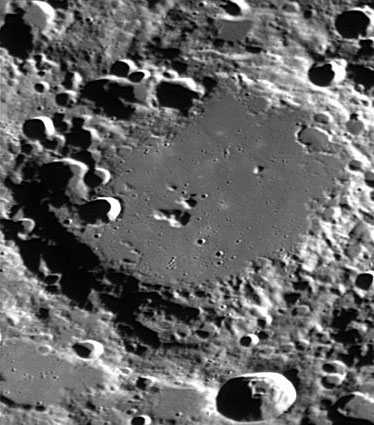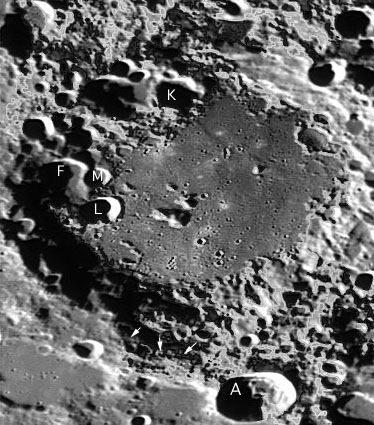November 14, 2004
Longo and Far Away
Image Credit: Wes Higgins |
|
Longo and Far Away Longomontanus is second only to Clavius in conspicuousness in the crater-rich southern highlands. Like Clavius, 145 km wide Longo has a broad flat floor, obviously emplaced as a fluid material, with a few scattered peaks protruding. Why are these peaks so off center? Is Longo a transition stage between a central peak crater and a peak ring basin? Wes' image shows more craters on the floor of Longo than I have seen before, but aggressive use of the Photoshop unsharp mask filter (mouseover) reveals even more. Some tiny craters are surrounded by bright halos of pulverized ejecta - these are very young craters. The NW wall is splattered with 15 or more craters - probably a cluster of secondaries from the formation of the Orientale basin. If the roughly same-size ghost craters on the floor of Longo are also secondary craters, then the flooding of the crater must be more recent than the time of the Orientale impact. This would mean that the smooth floor plains are not fluidized Orientale ejecta. Between Longomontanus A and the big crater's rim there is a rim section of an older crater (arrow in mouseover) - all that remains of an early crater squashed by the Longo. Check the Lunar Orbiter view if you aren't sure, and also notice on the east (outside of Wes' image) an even larger crater half covered by Longo. This old area is saturated with craters - every time a crater is formed it destroys existing craters. Technical Details: Related Links: Yesterday's LPOD: A 1689 Swedish Book on the Moon Tomorrow's LPOD: A Busier Longo |
|
Author & Editor: Technical Consultant: Contact Translator: A service of: |
COMMENTS?
Register, Log in, and join in the comments.





